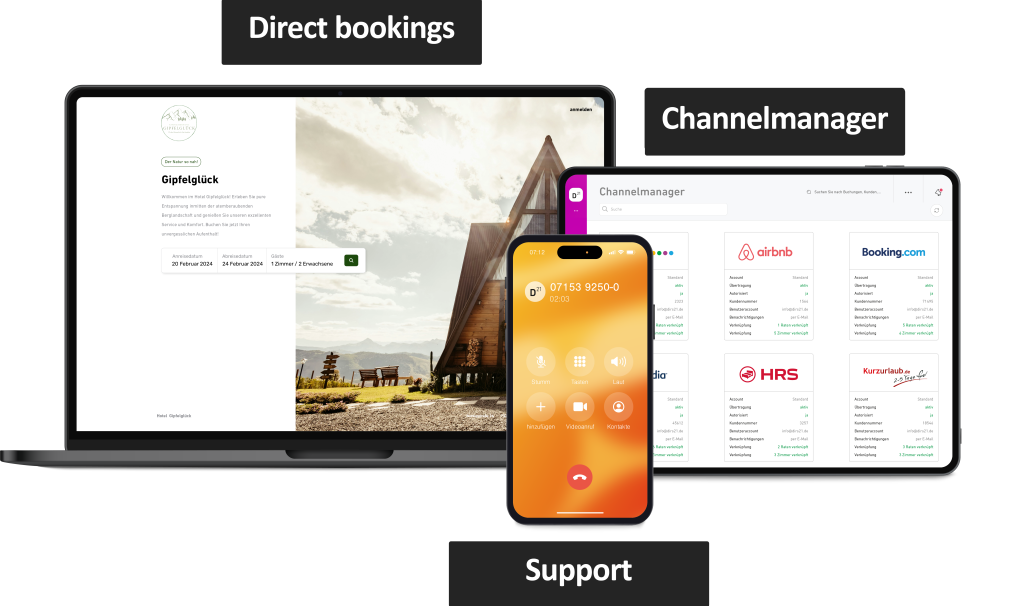In the “5 questions for…” section, employees of Hotelcore, customers, partners and industry experts answer questions in short interviews. This time, we talk to Tobias Kannenberg from DIRS21 about how hoteliers are increasing direct bookings and additional sales and how hotels are using the right tools to stay competitive these days.
Why are direct bookings so important for hotels and how can they reduce their dependence on OTAs?
Whilst it is important from a sales and marketing perspective to have a balanced mix of booking options, the website remains the most important distribution channel. On the one hand, distribution costs can be significantly reduced through this channel, and on the other, direct bookings open up significantly more potential for upselling and additional sales. With direct sales, it is also important to really utilise all possibilities. Keyword: personalised guest experiences.
A professional and individualised booking route not only creates trust, but also strengthens brand loyalty. And that is the prerequisite for not becoming dependent on the OTAs.
What strategies do you recommend to hoteliers to generate more direct bookings?
First of all, they should optimise their own website so that the content and booking route are user-friendly, mobile-optimised and intuitive. Targeted marketing campaigns – for example with direct offers, exclusive packages and seasonal promotions – create additional incentives. Visibility in search engines should also be increased through targeted search engine optimisation (SEO) and AI optimisation. Email marketing and social media also help to address guests directly and regularly. Finally, the integration of digital guest folders also plays an important role in providing guests with personalised information before and during their stay and increasing their loyalty.
How can additional services (e.g. spa offers, late check-out) be marketed in a targeted manner and what role do digital guest directories play in this?
Additional services are revenue drivers and strengthen customer loyalty. With the help of digital guest folders, hotels can communicate these offers directly to the guest in a personalised way and at exactly the right time (e.g. before arrival or during the stay).
Digital guest folders serve as an interactive tool to attractively present upgrades or additional services such as spa visits, late check-out or culinary experiences and make them easy to book.

What are the most common concerns hoteliers have about digital booking systems and how do you address them?
Many hoteliers have concerns about the complexity of the technology, but we counter this with an intuitive user interface and personalised support. There is also often a fear of errors and booking cancellations. We counter this problem with stable and GDPR-compliant systems to ensure the greatest possible security. Another common issue is the fear of losing control. Here we show that hoteliers have access to all bookings and customer data via the system at all times and therefore retain full control. The question of costs is also a recurring issue. With transparent pricing models and the prospect of long-term increases in revenue, we create trust and convince hoteliers of the benefits of digital booking solutions.
In your opinion, which technologies and tools are a must in the hotel industry today in order to be competitive?
First of all – when choosing the right technologies, regardless of which systems I ultimately decide on, the most important thing is that the systems work together smoothly and in a coordinated manner. This involves communication, interfaces, integrations and working methods. Of course, there are also solutions that try to do everything, but it makes more sense to combine professional solutions from specialists in the disciplines that are important to you, instead of settling for a “go-to solution”.
A must-have is, of course, your own website with an attractive and, above all, high-performance booking engine. Equally important is a channel manager that ensures that all booking channels are synchronised in real time. A property management system (PMS) is necessary to make administration efficient and centralised. In addition, digital guest folders play a crucial role as they act as a communication and upselling tool. Reputation management tools help to manage guest reviews in a targeted manner and maintain a hotel’s own image. Finally, revenue management systems (RMS) are also essential in order to optimise prices intelligently and react to current market developments. All in all, however, you always have to look at your own business to see which systems really make sense and are suitable.
Tobias Kannenberg in conversation with Jessika Hädecke, Gastfreund GmbH

